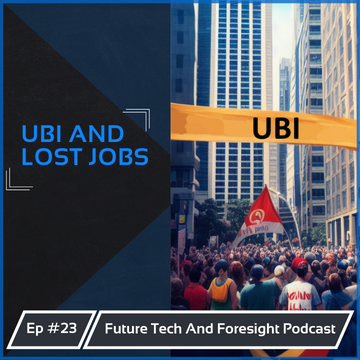About The Episode
Looking again at Universal Basic Income, it’s critiques, alternatives, and if the coronavirus pandemic is bringing it to reality
Transcript
Intro
Just wanted to mention that I’ve brought up technologies fighting the virus a few times, as this fits in the main theme of this podcast, I absolutely want to say that it’s obviously the medical professionals that are putting themselves on the line and working incredibly hard to battle this. Technology is cool, but the real work being done is by humans.
Along with Italy, here in Spain you may have heard that every night at 10pm we all go to our roofs or balconies and cheer on and support the staff in hospitals and clinics, I hope this trend continues in other countries as this global problem continues. The acts of solidarity like this along with seeing innovative community actions like a free fitness class given by a personal trainer on his rooftop to surrounding neighbors, or a saxophone and guitar jam applauded by surrounding neighbors has been great to see shared on social media.
This is also a really interesting time for different reasons. 2 episodes ago I started talking of Universal Basic Income (UBI) as one of the first solutions to a future where automation eliminates a large proportion of jobs. Yet only in this last week did this future solution get thrust into the present, or at least parts of it.
So for today’s episode we will look at a few things surrounding UBI. First the main criticisms of it, secondly some alternatives, and thirdly the current manifestations of it that are possibly starting to come about across the world in response to this economic crisis we are entering.
Critiques of UBI
Perhaps the most frequently used point against UBI is the laziness argument. It comes in many forms but ultimately says something to the effect of, if you give people free money they won’t be incentivised to work but rather to be lazy as well as lose the meaning in their lives that a work provides. Though this would appear to be almost common sense, I think that the examples provided in the previous episode show a different story. There have also been studies that look at the results of several basic income programs to answer this question specifically. One in particular found, “Overall, the programs analyzed suggest either no effect on labor market supply or a slight reduction in work and earnings. The evidence does not suggest an average worker will drop out of the labor force when provided with unconditional cash, even when the transfer is large.“ Though of course all pilot programs that have some form of UBI have not been permanent, and are not perfect examples, the findings do tend to lead one to think that the first critique doesn’t necessarily hold up.
The second main argument against UBI is usually connected to the price tag of such a policy. For this point I have to confess that I am actually on the fence. There are several arguments and reports on both sides that I think I won’t make a solid argument for one case or the other. I will definitely have to invite people onto the podcast who have more expertise than myself on the subject. But this is also why there is such debate around the issue, and why there are so many alternative programmes presented. As mentioned previously, one of the main proposed alternatives is for a UBI programme that replaces all social welfare programmes like, food stamps, housing subsidies etc. The argument typically made for this is that doing otherwise would be too expensive and that a nation couldn’t absorb all the extra costs. The usual price tag is that a Universal Basic Income or Guaranteed Minimum Income would require some 1000$ per month to essentially end poverty. If we use America as an example, some 210 million people are above the age of 18 and thus eligible for most forms proposed, which would cost the American government 210 Billion dollars….per month! This is about 2.5 trillion USD a year, no minor sum.
Whereas on the other side of the argument with a UBI in place, many societal expenses would be reduced or even eliminated, like those connected to petty theft, prison and justice systems, mental and physical healthcare costs, homelessness etc. Poverty has been shown to be one of the most expensive things in our modern society. Studies across different western countries show that a single homeless person costs the taxpayer an average of some 20 – 35,000$ per year. It is no wonder why those who promote UBI claim that the estimated costs are usually not very accurate. The 1000$ per month example also happens to be the amount proposed by the recent presidential candidate Andrew Yang, who I would argue has been one of the main people pushing UBI into the public awareness, at least in the US. Andrew Yang’s UBI programme, better known as the Freedom Dividend, was going to be mainly financed through new taxes on the wealth generating large corporations like Amazon, Facebook, Google, a value added tax, and consolidating some welfare programmes, and he did a great job pushing the idea that it was financially feasible to implement such a programme.
One of the more obvious points against UBI is that it is in part, wasteful in it’s approach. If everyone over the age of 18 is to receive these payments, then this includes people who absolutely do not need it. Think of the example of Bill Gates, who has an estimated net worth of some 96 billion USD. An extra 1000$ a month amounts to 0.000001% gain, which is unnecessary, and should be distributed to those who need it, or so it is argued. Of course those who do not need a UBI could refuse it, but in principle this can be seen as quite a valid argument against UBI.
And finally dependency on a government for your survival can bring with it many connected problems. We might not know the psychological impact of having an entire nation entirely dependent on a government. It might create a less innovative and more complacent society, and one who would be unwilling or unable to stand up to corruption for fear of being cut off from their main means of surviving. It is something worth keeping in mind as conversations about implementing UBI takes place.
Alternate solutions
So I’ve already touched on a few alternative solutions to UBI in this episode. Andrew Yang’s Freedom Dividend is perhaps the most well known right now, but it falls much more into the category of a minimum income which juuust covers your costs but still facilitates the drive to find employment.
In the last UBI episode I mentioned the Alaskan Wealth Fund, which is a more reduced form of this which only gives a few hundred to a few thousand dollars every year.
However there is one alternative that stands apart from the rest and this is the negative income tax supported by the well known neoliberal economist Milton Friedman. A negative income tax is as the name would imply, tied to the income tax system of a country, but reversed so that those earning under a specific threshold would pay no taxes, and those further below would actually receive income payments instead, while on the other side of the threshold, the proportion of taxes being paid would increase. Two key aspects of this solution stand out from UBI. The first is that most of the welfare and social programmes are usually considered to be rolled into this single payment system saving on the administrative and bureaucratic costs of programmes like food stamps, welfare, social security etc. The second is that it would still require a larger administrative effort compared to a flat UBI approach where everyone gets money, but at the same time, the money goes to those who need it more and not to the Bill Gates of this world as mentioned before.
Coronavirus inspired UBI Policies around the world.
But I think this now lays the framework for what we are experiencing today with a global slowdown, possible economic recession, and looming depression due to the covid-19 enforced quarantines and closing of businesses across the world. As I’m sure everyone who is listening knows, startups, small businesses, entire industries, and the people connected to them across the world are struggling financially with many already approaching failure while individuals struggle to pay for basic living needs. This is exemplified by statistics such as 40% of all Americans don’t have 400$ in their bank accounts to deal with an emergency situation, which I think can explain the pictures and stories shared of low gun and ammunition supplies bought during the initial panic and valued nearly as much as the now highly sought after toilet paper rolls..
But it would appear that financial relief programmes are going into place across the affected countries, which many are touting as a possible prelude to UBI programmes.
France’s finance minister, last Tuesday detailed €45bn in direct tax breaks and direct state payments for the country’s economy. Of this, €8.5bn will be used to support workers who have been temporarily laid off by employers due to the crisis.
Spain
Spain’s Prime Minister announced €100bn of loans and guarantees for companies in need of cash, as part of what was described as the “biggest mobilisation of resources in the country’s democratic history.”
Workers will be able to receive unemployment benefits even if they have not paid enough in social security contributions. Those who become unemployed or lose their regular income will be able to postpone their monthly mortgage payments as well as their utility bills. But the more relevant part of the Spanish Emergency package for this episode is to support the more than 3 million self-employed workers. The government will allow them to halt their business by citing “force majeure.” This would allow them to receive benefits similar to those for the unemployed, which can go to a maximum of 2000e per month.
With the already announced £330bn package of government backed-loans to help businesses, it is expected that in the next few days it will be further outlined how that helps workers whose jobs and wages could be hit by the virus. Wage subsidies are being discussed. The government is also being urged to pay wages if companies agreed to keep workers on.
Perhaps the most striking of all the emergency packages is that under discussion right now in the USA. A stimulus package is being outlined that could propose sending payments directly to Americans totaling $500 billion. This is broken up into two parts: The first one would be $1,000 per person, and the second $500 per child. Though like the other examples mentioned above, this will occur only one time in order to deal with the immediate need of people, however there is a plan to have a second package if the emergency continues.
Many other countries are also preparing or already putting out emergency packages that include support to workers but also to businesses of all sizes. We will have to see if this pandemic subsides in the next few weeks or months and the support along with it, or if this black swan event leads to a new paradigm where forms of UBI are implemented across the world.
As we’ve seen today there are multiple UBI forms, which each come with their own benefits and problems. Hopefully this episode has given you a first glance into the arguments for and against the various UBI possibilities that are out there today. I personally do not think that one solution will work for every country and if we are to have real UBI programmes implemented in the future we will see many different programmes. I personally would never have thought that UBI would be brought up so soon, and especially due to this reason. Even if the measures are temporary I think that the discussions and the increased awareness around this topic is important especially as the implementation of automation is hastened during this current crisis.
SO as these first series of episodes are nearly at an end, next week’s episode will be a summary of all the main ideas presented in the podcast so far.











